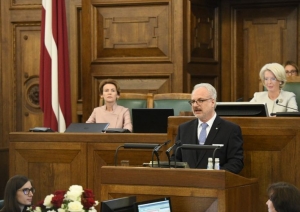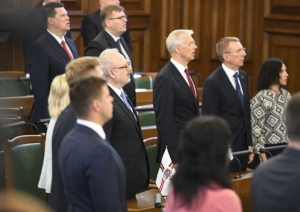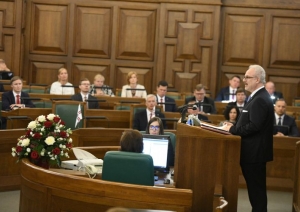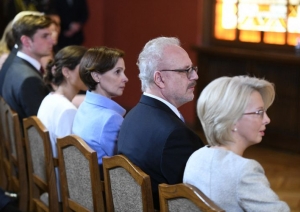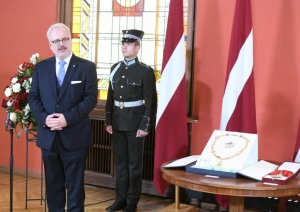Dear Representatives of the People,
I
“People create states themselves, and actual law of the people is based on the states,” passed an idea Mr Jānis Čakste in 1921.
However, the power of the law of all people depends on our skills to take care of the common good of society.
Agreeing upon the common good requires hearing the voices of all groups of interest and finding the best solutions through heated debates and productive disputes. Interests can be contradicting and mutually exclusive. Hence, our duty as the top officials of the country includes balancing them responsibly.
II
Many generations create a common good.
We are only a part of that sequence of generations.
We have inherited our country from the previous generations, which had won and shaped it. Own country is an excellent value per se.
Yet, common good also has a future dimension. Our task is hand over our country to the next generations better than we inherited that. One’s own country must be continuously adjusted, renewed and modernised so that it would be sustainable. That is our duty towards the history.
Common good as a political focus, responsibility for the next generations, and sustainability as a measure of politics is enshrined in the Preamble of the Satversme (Latvian Constitution).
That is the way of thinking characteristic of a modern and sustainable country.
The latter is still reflected only in the constitutions of several countries. We can also be proud of our Satversme in that sense because it is the oldest in Europe, but a far-reaching and future-oriented fundamental law of our land responsibly at the same time.
III
Dear Members of the Parliament,
There are three directions I intend to think and lead in the name of the common good during my presidency. I will be grateful for your support and cooperation.
These directions are solidarity, affiliation, and a modern and sustainable country.
Speaking about solidarity.
We all know that Latvia is among the most unequal countries in the European Union. That is not a sudden incident but rather a lingering illness for many years.
New Constitution of Switzerland of 2000 includes a statement that I find very pointed, “The strength of a people is measured by the well-being of its weakest members.”
In our Satversme, the same idea is expressed by different words as the idea of responsibility and solidarity. Smart solidarity policy incorporates not the only the redistribution of income. The smart policy creates equal opportunities to earn by working. Again, solidarity includes areas that cannot be measured as a balance of income/spending.
I call on everybody to shape a long-term solidarity policy all together.
IV
About affiliation/belonging.
Dear Colleagues,
Quality of human life definitely includes also affiliation and participation in one’s own society and environment.
The role of affiliation and national identity is increasing in the era of globalisation, and it is the contrast to the alienation of globalisation.
Although it is unusual, I also enclose the respect of humans towards nature, caring attitude and responsibility towards nature into the identity that is a characteristic feature of our, Latvian, culture.
Our affiliation to the Latvian nation, in whose language, culture, and historical memory we identify ourselves, is a precondition for the existence of the Republic of Latvia.
The future of Latvia requires the participation and collaboration of all the people living here. Latvian identity is open, and every individual living in Latvia is invited to join it. In this context, we must be aware of two comparatively new directions of policies and shape them actively further on, that is, demography policy and diaspora policy.
Latvian language, culture, history and world outlook do not belong to Latvians only. Everyone who identifies oneself with some minority is kindly welcome to participate in the life of the country by preserving one’s minority culture, language, and traditions in parallel. It is a contribution to richness and diversity of Latvia’s culture.
Latvian language as the official language is the language of democratic participation of all the people of Latvia. Latvian culture, I mean in the broadest sense, is the code of our society and the foundation of our feelings and communication. Perception of the history of Latvia and the world at large stems from our experience, wherefrom conclusions for nowadays follow.
I would like to emphasise, among other things, the fact that we must carry out a thorough assessment of the recent past, especially the occupation period, from a democratic, political, and ethical viewpoint.
I consider that Latvianness should be vested broader, deeper, and dynamic content than one has used to think daily.
Our roots rely on the language and culture, but the dimension of future also becomes more and more significant for modern Latvianness, which includes both our values-based identity and our future-aimed ideas, projects, and ideals.
V
Dear Compatriots,
The affiliation has a broader dimension, as well. We are an integral part of the West and Europe, and not some kind of bridge between the West and the East. I decline such a metaphor strictly.
The Latvian Army, which marked its centenary two days ago share joint responsibility for peace and security in Europe and beyond together with our partners.
Our responsible participation in NATO single security system has fruited in significantly strengthened security in Latvia and the entire region.
VI
Dear Members of the Parliament,
In the next decade Latvia shall become a modern and sustainable country of Northern Europe.
The country, which would even be among the leaders in specific areas on a global scale, becoming a model for other countries.
There are such opportunities, and we must only be able to use them.
VII
My vision of Latvia as a modern and sustainable country - and that is a real vision! – means decisive elimination of all the already-known and existing disadvantages at first.
One must take a broom and sweep the house free from that garbage that has accumulated for thirty years and lagged behind, and separates us from highly developed law-based democracy, for instance, dependence of political parties on donors, fraud in procurements, corruption, tax-dodgers, where fraudsters receive a part of the common good but do not participate in multiplying it, shadow lobbying and so on.
Such absurdities that everybody knows and is tired of cause bitterness against the state among decent citizens.
How such challenges can be solved by legal means is generally known for a long time. Compromise is impossible under the rule of law.
Of course, it is doubtful whether such problems can be eradicated completely. However, minimising its cumbersome impact on our society is definitely possible.
Here we need only a political will.
I invite you to create and implement this political will all together so that those issues would not top the agenda of our society.
VIII
However, that will not be enough.
For the common good be sustainable, deliberative reforms in the name of future are required.
The government has initiated several substantial reforms, id est, regional reform, school network reform, healthcare reform, as well as judicial reform, etc. They discuss reforms vigorously, and that is normal and right in a democracy.
Nevertheless, there are still many areas where the definition of policy and potential reforms is at the stage of exploration. I would like to mention arrangements of the issue on financing of political parties, information environment policy, ensuring diversity and quality of mass media, especially public mass media, and quality-driven education and science policy and many others.
Our understanding of the basis of economics should also be adjusted to the current situation. Nowadays, economics is a final product of several successive stages: education – science – innovation – economics. New economic policy must link all these stages in a single chain.
Shared duty of all us as citizens, your task, dear MPs, as politicians, and my responsibility as the President of Latvia include participation in the debate on reforming so that we all together would reach the best possible result.
IX
Thanks to our abilities, potential, and ideas, we, Latvians, can both improve the Republic of Latvia efficiently meaning the quality of our own lives and are able and ready in principle to contribute also to the development of Europe and the world.
This potential has been used weakly up to now. Although we have useful elaborations, we have marked ourselves as like-minded relatively pale in a common European and Western intellectual space currently. Latvian contribution to our broader area of affiliation, namely, Europe, the West, and the world must become more visible.
X
Therefore, the direction of modern country and sustainability I have outlined also includes active engagement in solving European and significant global issues.
It is also our responsibility that the European Union would return on the track that it has partially lost in recent years.
At present, we have ensured an individual of Western democracy with the most extensive freedoms possible in the entire history of humankind.
Yet, the question of whether a human will determine power over technology or technology will rule a human gathers year by year. Freedom is a quality of civic society, whereas it is not mandatory in a technology-based society at all.
Thus, we must take care so that the progress of technology would not strangle the autonomy that humans have reached so far again.
Europe begins to realise the sharpness of the challenge, but the solution is not found yet.
But why could not we, Latvians, offer those solutions?
XI
Dear Members of the Parliament,
Today, when I do hereby take my oath of the President of Latvia in the 101st year of the existence of the Republic of Latvia, I am aware that I have been passed the baton from my predecessors, who all have built and shaped the character and significance of this post in various circumstances of our complicated history.
The traditions emerging throughout that history empower and inspire me to provide my contribution to further development of the latter now as well.
I dignify the founder of the president institution of the Republic of Latvia, our first President of Latvia Mr Jānis Čakste, who had always strengthened democratic values and Latvia’s belonging to Europe.
I highly esteem Mr Gustavs Zemgals, his modesty and humbleness while serving as a top official for Latvia.
I remember that Mr Alberts Kviesis as the President of Latvia, relied on his background as the judge.
Faith in the future of Latvia, a tremendous capacity for work, and ability to lead on others to work for the benefit of Latvia are the best qualities we can learn from the first and later frequentative Prime Minister Mr Kārlis Ulmanis.
Acting Presidents of Latvia during the occupation of Latvia, Speaker of the Saeima Mr Pauls Kalniņš and Vice-Speaker Bishop Jāzeps Rancāns, cleaved Latvia until their dying day, inspired not to lose faith in the rebirth of Latvia.
Together with the diplomatic corps of Latvia, Heads of the Diplomatic Corps in particular such as Ambassadors Mr Kārlis Zariņš, Mr Alfrēds Bīlmanis, Mr Arnolds Spekkis, and Mr Anatols Dinbergs, they embodied continuity of the statehood of Latvia and preserved the legal capacity of the Republic of Latvia until the restoration of its independence.
I am grateful to Mr Guntis Ulmanis for the restoration of the President’s institution in the spirit of the Satversme and traditions of Mr Jānis Čakste. He is a well-doer who has decently fulfilled his duty encoded in the blood of his family.
Confidence and strength of Dr Vaira Vīķe-Freiberga in the international representation of the country and foreign policy inspire me. During her presidency, ideas of Latvia were voiced loudly and explicitly as never before, and Latvia returned to Europe and international arena full-fledged.
I respect creative activity, exactingness, and constant growth of Mr Valdis Zatlers while being the President of Latvia very much. His steadiness and calmness provided us with the necessary stability during the hard years of crisis.
I find openness and regular dialogue of Mr Andris Bērziņš with all the people of Latvia in all the parts of Latvia, not only in Riga, very important. Thus, I will try to follow his experience in my efforts to visit cities, towns, and regions in Latvia.
I highly appreciate the achievements of Mr Raimonds Vējonis in strengthening internal and external security of the country. He will always be my role model of the Supreme Commander-in-Chief of the National Armed Forces, whose elaborations I will strive to continue.
XII
Dear Members of the Parliament, Dear Colleagues, Dear Friends, Dear Compatriots,
Dear People of Latvia!
We are as great as our will is.
Solidarity, a sense of affiliation to Latvia and Europe, the opportunity to live in a modern country are the foundation of the sustainable will of the state.
The ideal country does not exist, as progress would discontinue.
A life without ideals would be individually miserable and politically useless.
Let us work together for the benefit of our country!
Thank you!





